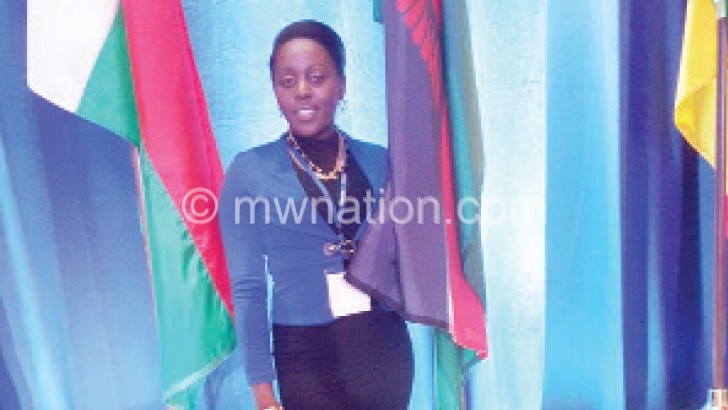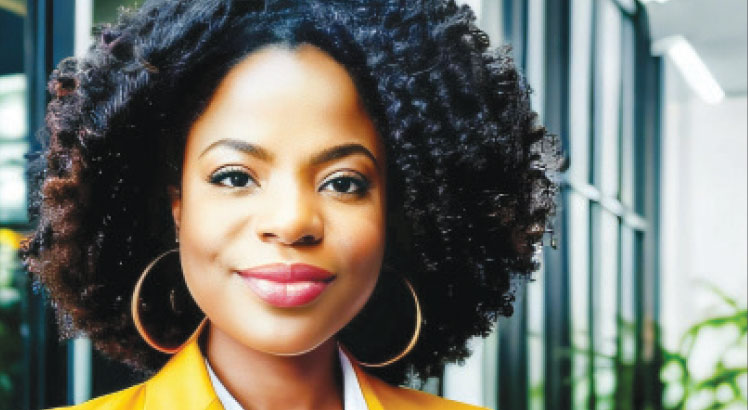Virginia Khunguni: Founder of Girls Arise for Change
Virginia Khunguni, 28, always dreamed of becoming a music producer, but her dream was shattered when a producer raped her. She was an orphan living with her grandparents at the time. Khunguni grew up in a community where girls who got raped or abused were accused of being loose, called different names and stigmatised. She was not going to risk that nor was she ready to be forced out of her only home. The young woman, therefore, chose not to report the abuse. Today, Khunguni works to combat child marriages, rape and child prostitution through her Girls Arise for Change initiative. She helps victims of rape get psychological and medical support for those that have been infected with HIV or STIs, among other things.
Khunguni comes from Kafupa Village, Traditional Authority (T/A) Kapeni in Blantyre, but was born in North Carolina, USA where her family of three lived. They returned to Malawi in 1991.
She attended primary at Chigumula Primary School in Blantyre before going to Limbe Private Secondary school and Wonderful Gardens Secondary School in Blantyre. She proceeded to the Malawi Institute of Journalism (MIJ) to study for a certificate in journalism.
The abuse she encountered while trying to pursue a music career is what motivated her to come up with the Girls Arise for Change.
“I had always dreamt of becoming Malawi’s first female producer. So, after secondary school, I started going to music studios to learn about sound engineering and music production. One day, a producer in this other studio raped me.
“My grandparents vowed to throw me out of their house should any man touch me inappropriately. My granny initially warned me that the career I was pursuing was for men and should anything happen to me, she would throw me out of the house,” she explains.
Just like in most societies in the country, Khunguni grew up in a community where girls who got raped or abused by men were accused of being loose and called different names while being stigmatised.
“I suffered in silence, scared that I may have been infected with HIV or impregnated. I quit the dream of becoming a female producer because I could no longer trust any man around me,” she narrates.
In 2009 after attaining her journalism certificate and later embarking on her journalistic journey, Khunguni says she came across many sexual abuse cases in girls who, just like her, could not report to get justice because their communities never supported them and instead valued men as the superiors.
She introduced a radio programme called Girls Arise, through which she would go to various communities and talk to girls who were facing different kinds of abuses.
She says: “Girls Arise was a radio talk show that brought out issues affecting the girls’ development. The programme featured victims of gender-based violence [GBV] and it brought in human rights experts and medical personnel to share their advice and expertise to the victims. It also brought in community members to discuss how communities could support efforts of combating GBV.”
After airing it for over a year and receiving overwhelming response from the public, with many reports from traditional leaders as well as community members, the journalist felt a radio programme was not enough to help end violence against women and girls. She needed to do more.
“So in 2013 with assistance from an American friend who was working as a Peace Corp in Malawi, I founded the initiative. The aim has been to end cultural and social practices that are standing against girls’ academic and health development in the country,” she says.
She began forming community support structures in the few districts she had contacts.
Girls Arise for Change is voluntary and has no funding. It is totally run and owned by communities through a selected committee responsible for ending practices such as child marriages and sexual practices on girls. It also helps adolescent mothers return to school.
Khunguni works in over 20 districts in the country with her Girls Arise for Change as well as her other commitments outside the initiative.
She says out of every eight girls she meets, four or five of them have been raped, forced to drop out of school to go into early marriages or forced into child labour.
“There are even some that have been forced into prostitution and these are just girls aged between 10 and 16,” she says.
The organisation understands that poverty is the main influence behind many challenges that girls are facing in terms of education and health. It is, therefore, empowering girls with skills to help them earn an income.
Under the Girls Arise for Change initiative, the young woman says they are working on the ‘I Rise’ project, providing skills to girls who finished secondary school, but cannot afford college education due to poverty.
“Through this project, we have partnered with friends from Nigeria, Kenya and America and all materials made by our girls in the communities will be sold in these countries and the proceeds returned to them.
“We are opening a fashion market in Lilongwe this year where fashion merchandise made by girls in rural communities will be sold. The I Rise project is also training some girls in solar installation, culinary arts and hair dressing skills among others,” she says.
Centre for Young Achievers and Community Opportunity (Ceyaco) is one of the organisations based at Area 23 in Lilongwe, benefiting from the I Rise project.
The organisation’s executive director Maxwell Chaziya says about eight young women from Ceyaco have been recruited for the I Rise trainings.
He points out that as a semi-urban community, surrounded with a lot of bars and bottle stores, early marriages and commercial sex work for girls are rampant. They are working with Girls Arise for Change to minimise the practices.
Girls Arise for Change initiative is working with communities in Mzimba, Phalombe, Lilongwe and some parts of Blantyre.
Among other challenges, Khunguni says the initiative faces lack of volunteers to help reach many communities. She notes that many Malawians want money before they can volunteer and this has been a setback.
In addition, she says resources such as materials for supporting the girls’ education as well as materials for their empowerment trainings prove challenging to get.
Despite all the challenges, she says the initiative plans to reach out to many girls who have the potential to develop their communities, but are undervalued by society.
“Girls Arise for Change intends to help many communities plan, implement and run the projects for ownership. One of our biggest plans is to establish community support centers in rural communities (one in every traditional authority area) where victimised girls will get support. The centres will also provide financial empowerment to mothers to support their daughters instead of forcing them into early marriages,” she says.
Khunguni, the last born of three, is the only girl in her family. She is currently pursuing a degree at Mahatma Ghandhi University in Rwanda.
She has received several recognitions, including a certificate of civic leadership from President Barack Obama, two certificates of Special Congressional Recognition from the United States Congress and the Queen’s Young Leadership award. She also serves as an International Associate for Wagner College in New York.
Apart from the Girls Arise for Change initiative, she is also project ambassador for Population Services International (PSI) Malawi’s Youth Alert project hosting their radio magazine programme Youth Alert. n




